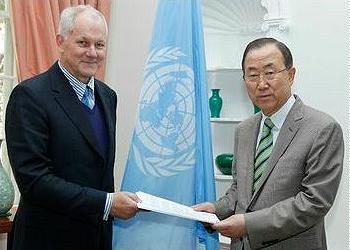
NEW YORK, New York, September 16, 2013 (ENS) – A United Nations team investigating the possible use of chemical weapons in Syria has found “clear and convincing evidence” that Sarin gas, a chemical weapon, was used in an incident on August 21 in the Ghouta area on the outskirts of Damascus.
The report, delivered to UN Secretary-General Ban Ki-moon Sunday and made public today, concludes that on the basis of evidence obtained during the investigation of the Ghouta incident, “chemical weapons have been used in the ongoing conflict between the parties in [Syria], also against civilians, including children, on a relatively large scale.”
The team, lead by Swedish chemist Dr. Åke Sellström, also concludes that “the environmental, chemical and medical samples we have collected provide “clear and convincing evidence that surface-to-air- rockets containing the nerve agent Sarin were used in Ein Tarma, Moadamiyah, and Zamalka, in the Ghouta area of Damascus.”

The investigating team arrived in Syria on August 18 and on August 21 the group was in Damascus preparing to conduct on-site inspections concerning the use of chemical weapons in Khan al-Asal and in Sheik Maqsood and Saraqueb. The secretary-general instructed the team to focus its investigation on the Ghouta allegations.
Now that the team has filed its report on the Ghouta incident, it will continue its investigations into the use of chemical weapons on these other locations.
During its investigation of the Ghouta incident, the team visited Moadamiya on August 16, and Ein Tarma and Zamlka on August 28-29.
Team members conducted interviews with survivors and other witnesses. Statements from more than 50 exposed survivors, including patients, health workers and first responders were collected.
The team also documented munitions and their sub-components, collected environmental samples and also collected hair urine and blood samples.
The samples were analyzed in laboratories designated by the Organization for the Prohibition of Chemical Weapons, in four European cities.
The secretary-general will shortly brief the press on the findings in the report following his meeting with the Security Council. He also will present the report to the UN General Assembly.
Secretary-general Ban expressed his “profound shock and regret at the conclusion that chemical weapons were used on a relatively large scale, resulting in
numerous casualties, particularly among civilians and including many children.”
In a note made public today, Secretary-General Ban condemned “in the strongest possible terms” the use of chemical weapons and said he believes “that this act is a war crime and grave violation of the 1925 Protocol for the Prohibition of the Use in War of Asphyxiating, Poisonous or Other Gases, and of Bacteriological Methods of Warfare and other relevant rules of customary international law.”
“The international community has a moral responsibility to hold accountable those responsible and for ensuring that chemical weapons can never re-emerge as an instrument
of warfare,” said Ban.
One of only seven nations in the world that are not Parties to the Convention on the Prohibition of the Development, Production, Stockpiling and Use of Chemical Weapons and on their Destruction, under international pressure Syria finally acceded to the treaty on September 14. Ban called the accession “a welcome development.”
The secretary-general welcomed the agreement reached on September 14 between Russia and the United States on a framework for the elimination of chemical weapons in the Syria.
Ban reiterated that “any use of chemical weapons by anyone under any circumstances is a grave violation of international law.”
Copyright Environment News Service (ENS) 2013. All rights reserved.
© 2013, Environment News Service. All rights reserved. Content may be quoted only with proper attribution and a direct link to the original article. Full reproduction is prohibited.
